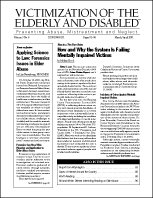Older Fraud Prevention, Intervention, and Victim Services Through Faith Communities
Author: Lisa Curtis.
Source: Volume 06, Number 06, March/April 2004 , pp.81-82(2)

next article > |return to table of contents
Abstract:
This is Part I of a two part article discussing the CASE project in Denver. Part I describes the factors that triggered the formation of the project, a description of the program components, and the challenges faced in its implementation. Part II, which will appear in a future issue of VED, contains an evaluation of various aspects of the CASE project, lessons learned, and how the program can be replicated in other communities. In Denver, people over the age of 60 make up about 18% of the population; however, they make up over 30% of the victims in cases prosecuted by the Denver District Attorney’s Economic Crime Unit. Elderly victims of crime often do not report their victimization. In most cases of elder financial abuse reported to the Denver DA’s Office, the reporting party is not the victim, but rather a family member, friend, caregiver, or advisor. In situations where crimes are not reported, victims may not receive closure and other supportive services, and perpetrators are free to continue victimizing others. To respond to these challenges, the Denver District Attorney’s Office expanded its elder fraud prevention program by launching a unique project of education and intervention through faith communities.Keywords: Clergy Against Senior Exploitation Partnership; CASE; Faith Community-DA Partnership
Affiliations:
1: Denver District Attorney’s Office.